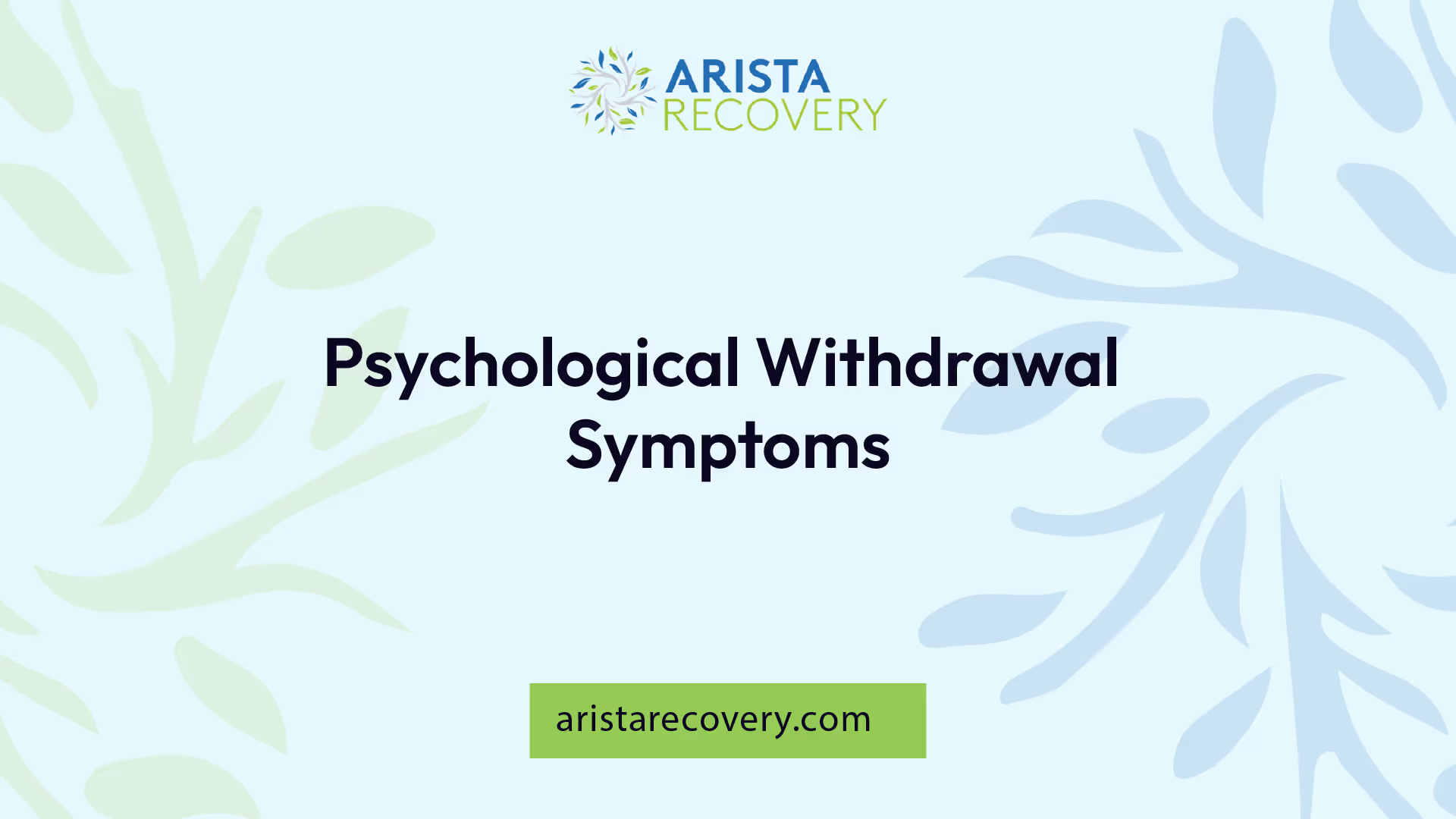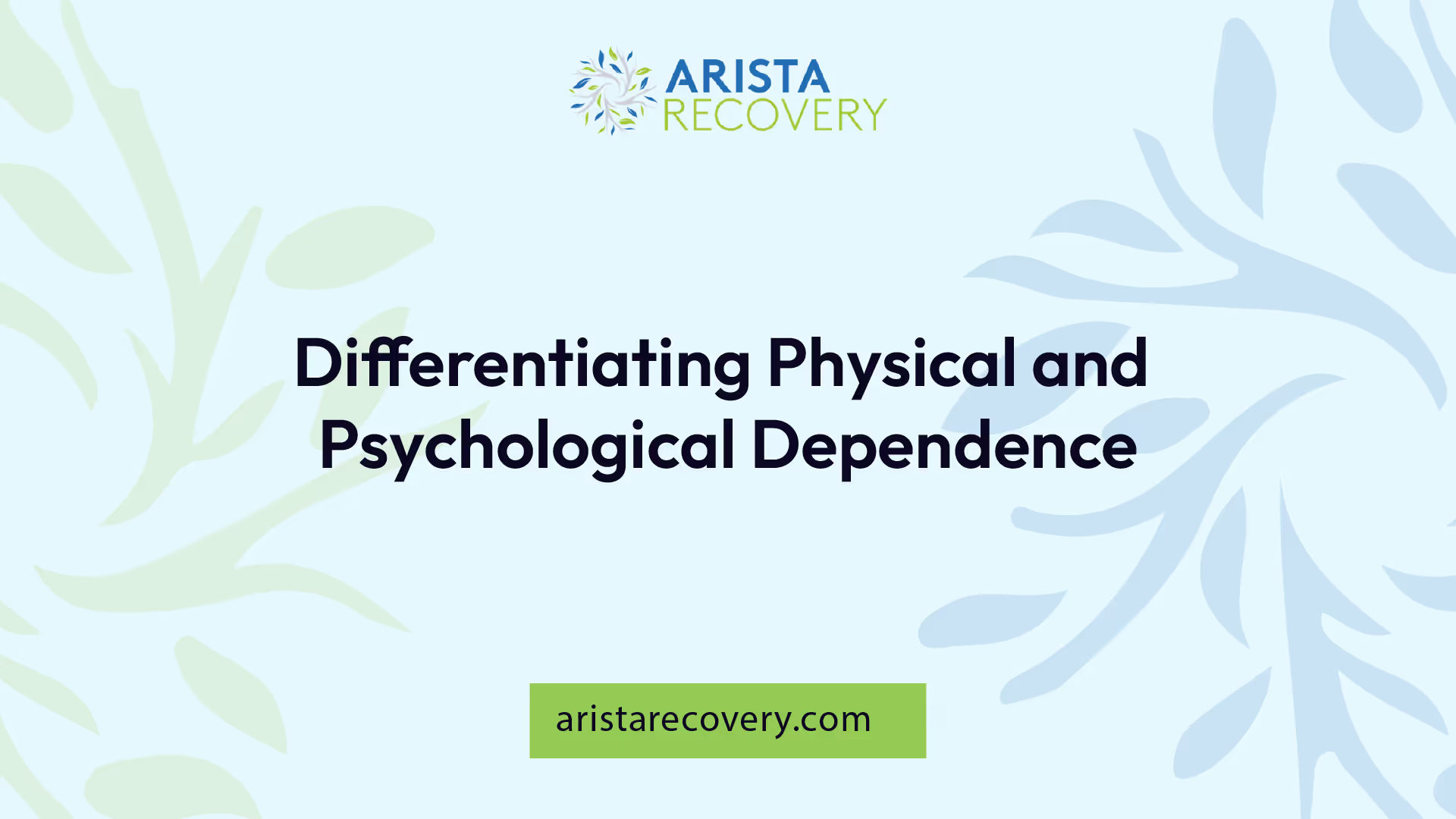Physiological Dependence in Addiction

Understanding Psychological Dependence
Psychological dependence forms a significant aspect of the complex nature of addiction. This form of dependence can manifest in individuals who consistently and frequently engage in drug use or certain behavioral activities. It's important to understand not only how this dependence develops but also the physiological impacts it can have on the brain.

Development of Psychological Dependence
Psychological dependence develops over time as the brain creates associations between a substance or behavior and the feelings of pleasure and relief from negative emotions that it elicits. This makes it challenging to cope without the substance or behavior.
This form of dependence is characterized by a strong desire or craving for a substance, preoccupation with obtaining and using the substance, intense cravings, and withdrawal symptoms when attempting to quit or cut back. This significantly impacts an individual's behavior, thoughts, and emotions.
Over time, an adaptive state develops after sufficient exposure to a stimulus capable of inducing psychological dependence, resulting in the onset of withdrawal symptoms that negatively affect cognition upon disengagement [3].
Impact of Neuronal Counter-Adaptation
Neuronal counter-adaptation plays a crucial role in generating withdrawal symptoms related to psychological dependence. This could be mediated through changes in neurotransmitter activity or altered receptor expression.
For instance, increased expression of AMPA receptors in nucleus accumbens MSNs is a potential mechanism of aversion produced by drug withdrawal [3].
The neurotransmitter dopamine, central to reinforcing beneficial behaviors, plays a significant part in this process. Large surges of dopamine caused by drug use can "teach" the brain to seek drugs at the expense of other, healthier goals and activities.
Ultimately, addiction can cause changes in the brain, affecting areas crucial for judgment, decision making, behavior control, memory, and learning, thereby influencing the brain's pleasure center and creating a reward response or psychological dependence on a substance or activity [1].
The development and impact of physiological dependence are complex and multi-faceted. Understanding the science behind it is the first step toward confronting addiction and seeking help. If you or a loved one is struggling with addiction, our articles on how to help a son with drug dependence and treating opioid dependence may provide useful information.
Psychological Withdrawal Symptoms
When tackling the issue of physiological dependence, it's essential to understand the different facets of withdrawal symptoms. Psychological withdrawal symptoms, in particular, can be complex and difficult to navigate.

Emotional and Cognitive Effects
Psychological dependence can lead to a range of emotional and cognitive effects during withdrawal. For instance, withdrawal from psychostimulants like amphetamine or cocaine can lead to significant emotional and motivational symptoms [3]. Individuals may experience marked cognitive withdrawal symptoms like depressive symptoms and increased anxiety. This type of dependence-withdrawal syndrome can also be seen in cases of behavioral dependence, such as exercise dependence in athletes.
Studies have shown that neurological changes can occur during withdrawal. For instance, in rats experiencing various types of withdrawal, the nucleus accumbens shows lower levels of serotonin and dopamine than controls. These neurotransmitters are associated with feelings of well-being and happiness, and their decrease is linked with depression and anxiety.
Co-Occurrence with Physical Withdrawal
Psychological withdrawal can occur alongside physical withdrawal symptoms, leading to conditions like post-acute withdrawal syndrome (PAWS). Approximately 90% of people recovering from opioid addiction and 75% of people recovering from alcohol addiction or other substance addictions experience symptoms of PAWS. Symptoms can range from mild to severe and can last for weeks to months, with symptoms fluctuating and intensifying under stress.
Physical dependence on substances can result in a range of withdrawal symptoms when the substance is not consumed. These can include hand tremors, gastrointestinal problems, depression, anxiety, sweating, and teary eyes. Psychological withdrawal symptoms can include panic, fear, and other emotional distress.
The symptoms of psychological dependence can vary widely among individuals due to differences in brain chemistry, lifestyle, and environmental factors. Recognizing these symptoms and seeking professional help are crucial steps in the recovery process.
The journey towards recovery can be challenging, but understanding the nature of psychological withdrawal symptoms can provide valuable insights for individuals struggling with physiological dependence. For more information on the different aspects of dependence and addiction, visit our pages on dependence vs. addiction and treating opioid dependence.
Differentiating Physical and Psychological Dependence
Understanding the distinction between physical and psychological dependence is crucial for anyone grappling with addiction disorders. Each has a unique set of characteristics and implications for treatment.

Tolerance and Withdrawal Symptoms
Physical dependence occurs when the body relies on a substance to function properly, which is characterized by the development of tolerance and the experience of withdrawal symptoms upon cessation of the substance. The body may require higher levels of the drug to prevent symptoms, but there is a limit to the toxicity the body can handle before experiencing adverse effects such as blackouts or overdoses [6].
The symptoms associated with physical dependence, such as nausea, vomiting, diarrhea, seizures, and hallucinations, are often more intense than those associated with psychological dependence. Some substances, like alcohol, benzodiazepines, and barbiturates, can result in potentially fatal seizures during withdrawal.
Psychological dependence, on the other hand, involves an emotional or mental attachment to a substance or behavior, leading to obsessive thoughts, cravings, and difficulty concentrating on anything else. This form of dependence may occur without physical addiction. For instance, marijuana is considered psychologically addictive rather than physically addictive.
Treatment Approaches
The treatment approach for physical and psychological dependence varies. Treating physical dependence involves working with a professional to gradually taper off use or stop use altogether under supervision to manage withdrawal symptoms.
On the other hand, treating psychological dependence often involves working with a therapist to explore triggers and create new patterns of thought and behavior. This form of therapy can help individuals understand their substance use, develop coping strategies, and build a supportive network to aid in recovery [5].
Long-term treatment for individuals struggling with either physical or psychological dependence should not significantly differ in terms of the overall plan of recovery. Both groups should be thoroughly assessed, treated for any co-occurring issues, involved in substance use disorder therapy, social support groups, and adjunctive therapies based on their personal circumstances.
Understanding the nuances between physical and psychological dependence is crucial in tailoring effective treatment strategies. For more information on this topic, check out our articles on dependence vs. addiction, how to help son with drug dependence, and drug alcohol dependence leads to addiction.
Substance Use Disorder Diagnosis
Correctly diagnosing substance use disorders is crucial to formulating an effective treatment plan. The Diagnostic and Statistical Manual of Mental Disorders (DSM-5) provides a framework for this diagnosis, which has evolved over time to reflect a more nuanced understanding of addiction.
DSM-5 Changes
The most recent edition of the DSM-5 has made significant changes to the diagnosis of substance-related disorders. It combined the diagnoses of "substance dependence" and "substance abuse" into one diagnosis called "substance use disorder" [5]. The change was made due to confusion in terminology and to better reflect the range of severity and impairment caused by substance use.
The DSM-5 diagnosis of substance use disorder is measured on a continuum from mild to severe. It considers criteria such as impaired control over substance use, social impairment, risky use, and pharmacological criteria. This shift in diagnostic criteria underscores the understanding that addiction is not just about physiological dependence, but also encompasses a range of psychological factors. For more information, see our article on dependence vs. addiction.
Severity Levels of Substance Use Disorder
The severity of a substance use disorder is determined based on the number of diagnostic criteria met. According to DSM-5, the severity of a substance use disorder can be classified as:
- Mild: Presence of 2-3 symptoms
- Moderate: Presence of 4-5 symptoms
- Severe: Presence of 6 or more symptoms
These symptoms encompass a range of issues, from physical withdrawal symptoms such as nausea, vomiting, and seizures, to psychological symptoms like cravings and inability to stop using despite negative consequences [7].
The treatment approach for a person with a substance use disorder varies based on the severity of the disorder. Both psychological and physical aspects of dependence need to be addressed in the treatment plan [7]. This can involve a combination of psychosocial interventions, self-help groups, and in some cases, medication. For example, treatments for alcoholism often include psychosocial interventions and self-help groups, but pharmacotherapies like Naltrexone and Acamprosate have also been approved for clinical use to reduce alcohol consumption.
Understanding the diagnosis and severity levels of substance use disorder is the first step towards recovery. If you or someone you know is struggling with substance use, check out our articles on how to help son with drug dependence and treating opioid dependence for more resources and information.
Recovery from Psychological Dependence
Recovering from physiological dependence requires a comprehensive approach that addresses both the physical and emotional aspects of addiction. This typically involves a combination of therapeutic interventions and the development of effective coping strategies for aftercare.
Therapeutic Interventions
Therapeutic interventions play a crucial role in treating psychological dependence. This often involves working with a therapist to explore triggers for substance use, create new patterns of thought and behavior, and address underlying emotional and psychological factors that may contribute to the addiction.
Various therapeutic modalities may be used, such as cognitive-behavioral therapy (CBT), dialectical behavior therapy (DBT), motivational interviewing (MI), and family therapy. These therapies can help individuals understand their dependencies, develop healthier coping mechanisms, improve their emotional regulation skills, and mend strained relationships resulting from addiction.
For more information about specific interventions for different types of physiological dependencies, you can refer to our articles on dependence vs. addiction and treating opioid dependence.
Coping Strategies and Aftercare
In addition to therapeutic interventions, developing effective coping strategies is vital for managing cravings and making positive changes in life. These strategies can include mindfulness techniques, stress management methods, and lifestyle modifications such as regular exercise, a balanced diet, and sufficient sleep.
Aftercare is also a critical part of the recovery journey. This typically involves continued counseling or therapy, participation in support groups, and regular check-ins with healthcare providers. Aftercare helps maintain the progress made during treatment and provides ongoing support to prevent relapse.
Psychological dependence is a complex issue that can significantly impact an individual's life. However, with the appropriate therapeutic interventions, coping strategies, and aftercare, recovery is possible. If you or a loved one are struggling with physiological dependence, it's essential to seek professional help. For resources and advice on supporting a family member with a substance use disorder, refer to our article on how to help a son with drug dependence.
The Neurobiology of Addiction
Exploring the neurobiology of addiction provides a deeper understanding of the complex processes that contribute to substance misuse and physiological dependence. This understanding can help those affected by addiction, along with their loved ones, better grasp the challenges faced during the recovery journey.
Brain Changes from Drug Misuse
Drugs can alter critical brain areas that are necessary for life-sustaining functions, driving the compulsive drug use that marks addiction. Areas affected by drug use include the basal ganglia, which constitute the reward circuit, and other parts of the brain such as the brain stem, controlling basic functions critical to life, including heart rate, breathing, and sleeping.
The neurotransmitter dopamine plays a central role in reinforcing beneficial behaviors. Large surges of dopamine caused by drug use can "teach" the brain to seek drugs at the expense of other, healthier goals and activities.
For those battling with addiction, it's essential to understand these mechanisms and the impact of drugs on the brain's reward system, ultimately leading to a state of physiological dependence. To learn more about the differences between dependence and addiction, read our article on dependence vs. addiction.
Impact on Brain Functions
Cues in a person’s daily routine or environment that have become linked with drug use can trigger uncontrollable cravings whenever the person is exposed to these cues, even if the drug itself is not available. This learned “reflex” can last a long time, even in people who haven’t used drugs in many years [4].
Moreover, the brain of someone who misuses drugs adjusts by producing fewer neurotransmitters in the reward circuit or by reducing the number of receptors that can receive signals. This leads to a reduced ability to experience pleasure from naturally rewarding activities.
As a result, a person who misuses drugs eventually feels flat, without motivation, lifeless, and/or depressed. They become unable to enjoy things that were previously pleasurable, leading to the need to keep taking drugs to experience even a normal level of reward, thereby creating a vicious cycle.
Understanding these brain changes and their impacts is crucial in formulating effective coping strategies and therapeutic interventions for recovery from physiological dependence. For guidance on how to help a loved one struggling with drug dependence, visit our article on how to help son with drug dependence.
References
[1]: https://7summitpathways.com/blog/what-is-psychological-dependence/
[2]: https://www.northstarbehavioralhealthmn.com/resources/defining-physiological-dependence
[3]: https://en.wikipedia.org/wiki/Psychological_dependence
[4]: https://nida.nih.gov/publications/drugs-brains-behavior-science-addiction/drugs-brain
[5]: https://www.healthline.com/health/psychological-addiction
[6]: https://www.ashleytreatment.org/rehab-blog/physical-and-psychological-dependency/
[7]: https://americanaddictioncenters.org/the-addiction-cycle/psychological-dependence
You’re not alone in this.
When mental health challenges and addiction intersect, it can feel isolating. At Arista, we offer compassionate, evidence-based, and trauma-informed care to help you heal, grow, and move forward.
You’re not alone in this.
When mental health challenges and addiction intersect, it can feel isolating. At Arista, we offer compassionate, evidence-based, and trauma-informed care to help you heal, grow, and move forward.
Support that moves with you.
You’ve taken a brave first step. At Arista Recovery, we’re here to help you continue with best-in-class care designed for long-term healing and support.
.webp)






